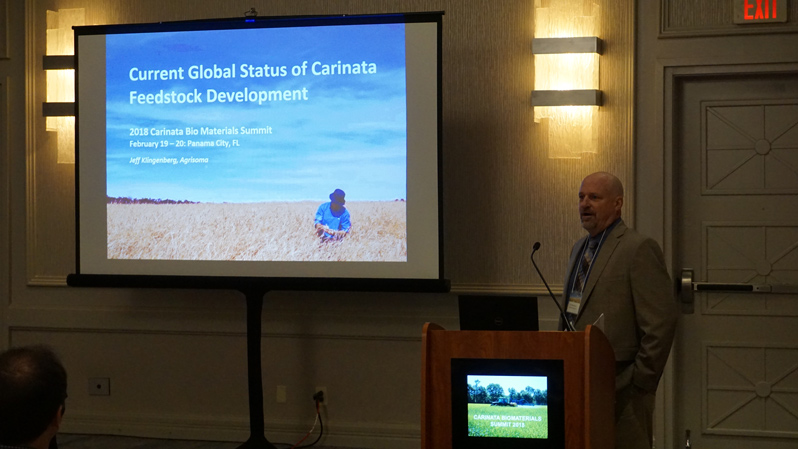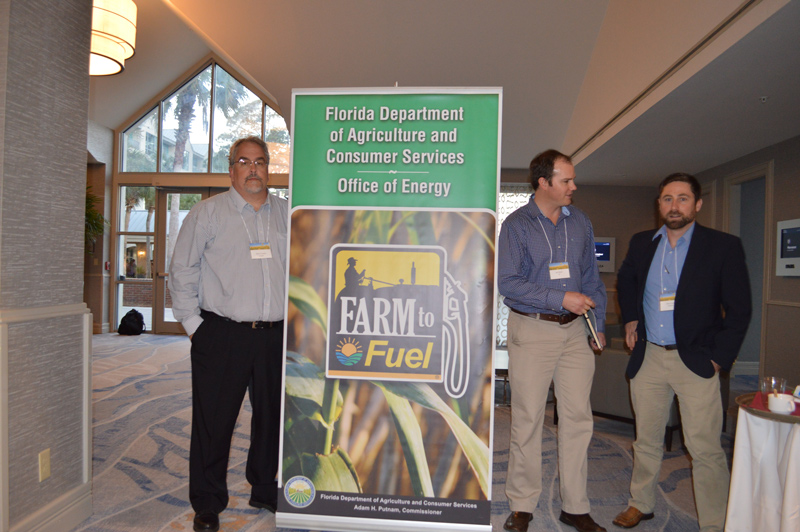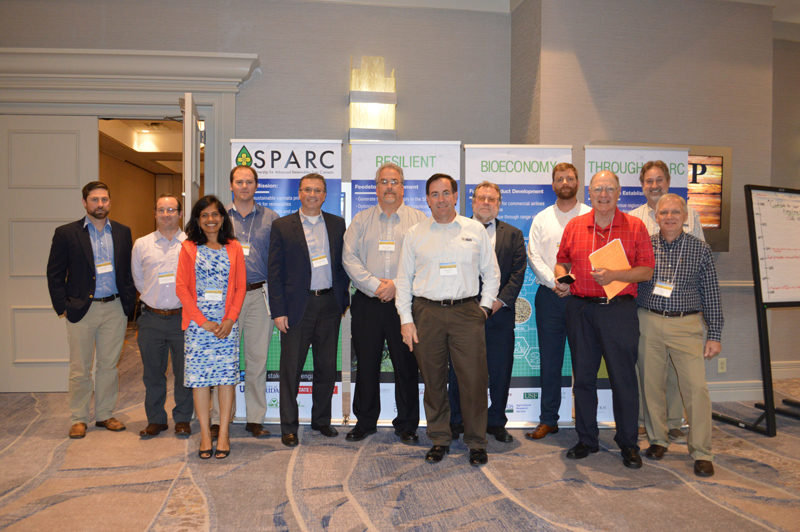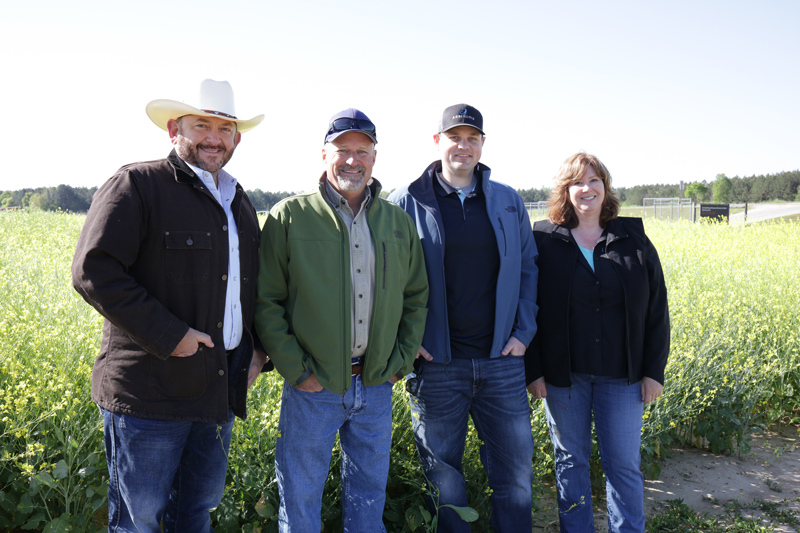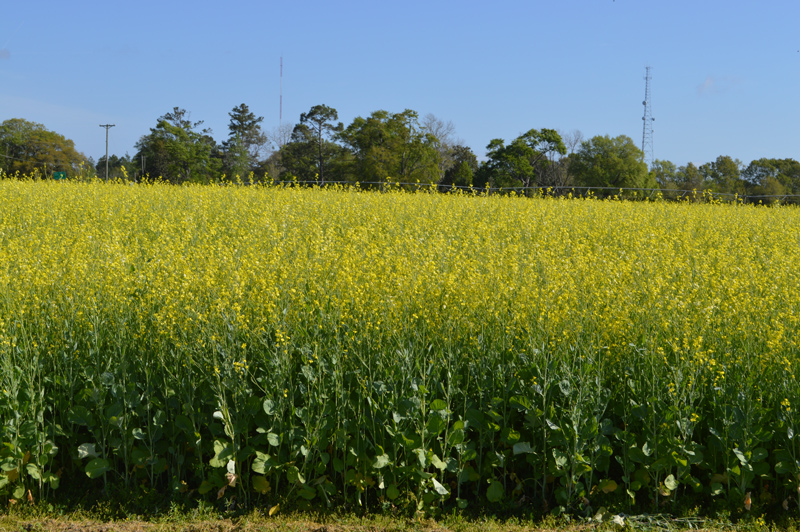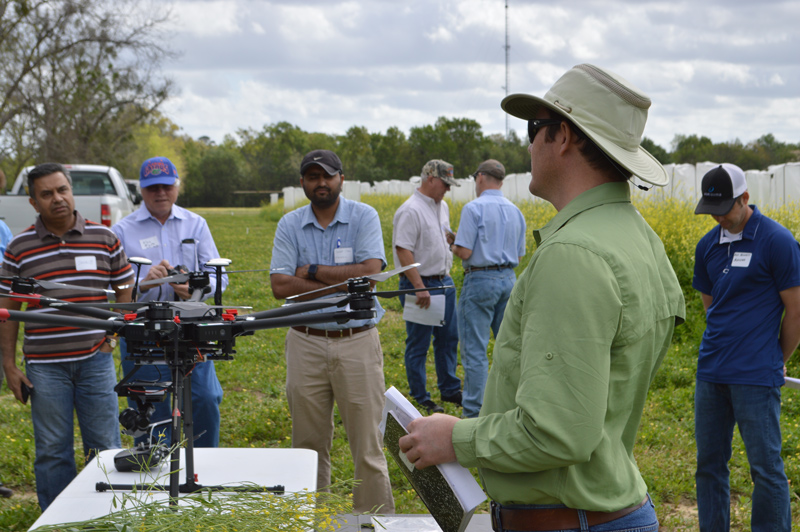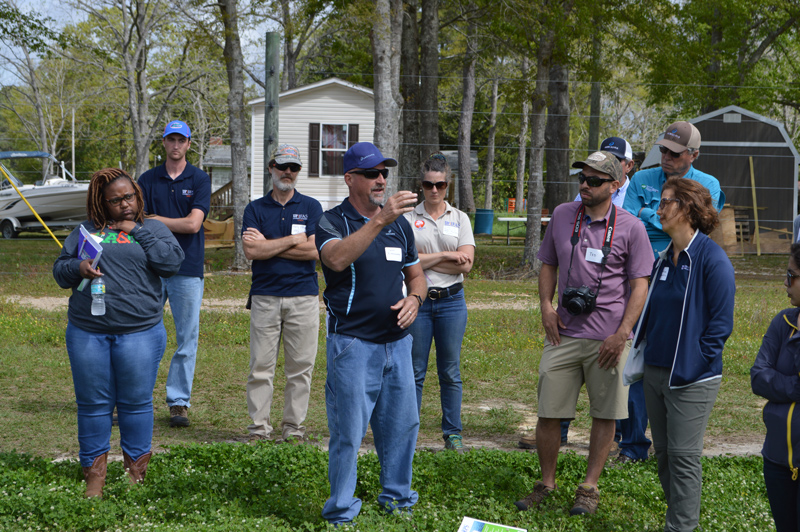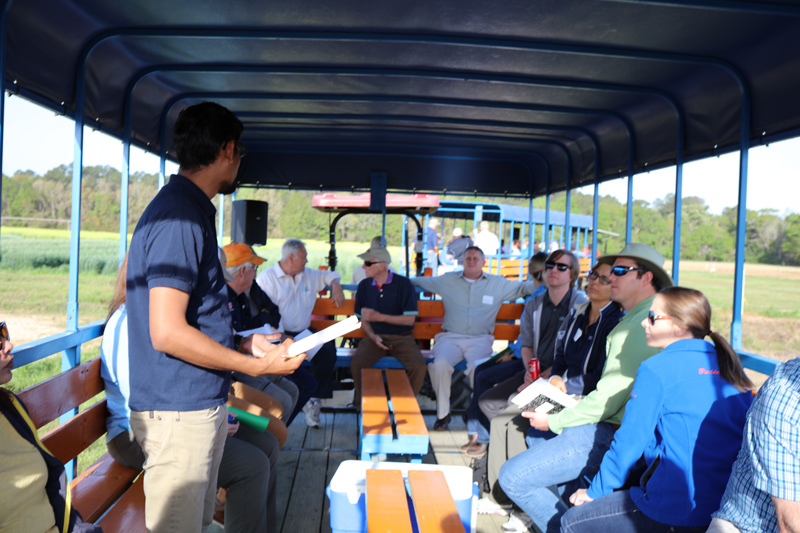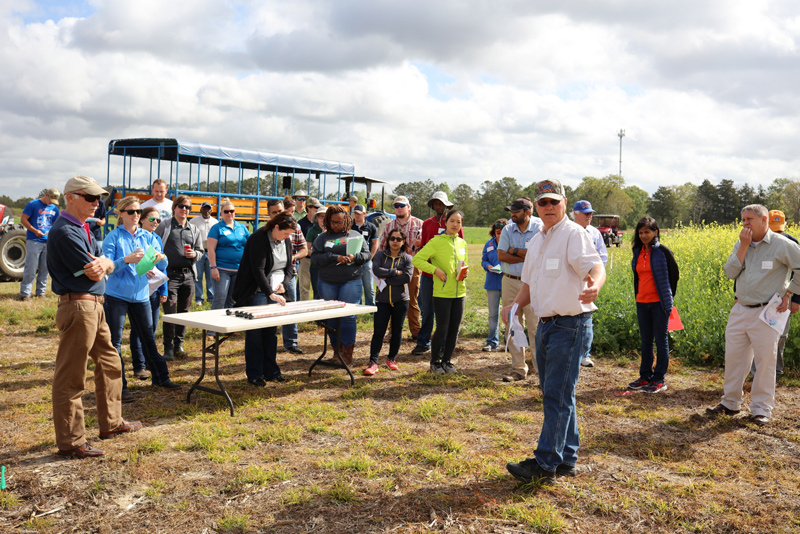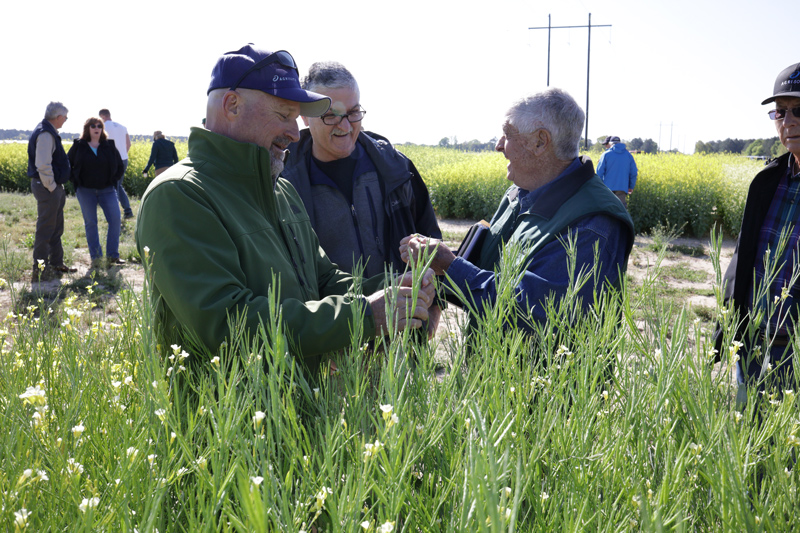
Message from the Executive Committee
Is it spring yet? It depends where you are, but regardless of where we have been this winter we all did experience some severe winter weather. Like us, carinata braved this weather as well. What emerged after the winter anomalies were some potential winners among Agrisoma’s existing pipeline of advanced carinata lines. The exciting thing about SPARC is that it is designed in a way that any seasonal variabilities or fluctuations lend themselves to generating more data, more good science and more ways to make carinata a viable option in the renewables space.
This quarter was a busy one with field days at Jay, FL, Quincy, FL, Milstead, AL, and Tifton, GA. All were well attended by various stakeholders and provided an avenue for useful discussions and relevant feedback.
We would like to congratulate Mike Mulvaney, Ramdeo Seepual, Austin Hagan, Bill Anderson, Dewey Lee and Wendy-Lin Bartels for taking the lead in organizing these events. We want to thank Agrisoma for co-sponsoring these events. The executive committee also had the privilege to be on a panel with our industry partners Agrisoma and Applied Research Associates, and CAAFI at the ABLC, 2018 in Washington DC, showcasing the public-private partnership that SPARC represents. We realize the importance of appreciating the differences that exist within such a partnership in order to make it thrive. Looking forward to meeting with all of you for some great data and information sharing sessions at the annual meeting in Quincy, FL on June 25th and 26th. Thanks!
SPARC Stories
SPARC Begins Extension Efforts to Promote Carinata in the Southeast
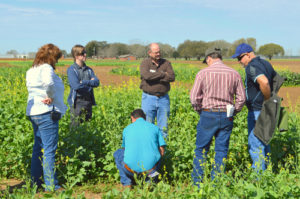
Jeff-Klingenberg-and-Chris-Bliss-Agrisoma-SPARC)-and-Dan-Geller-(SPARC)-in-discussion-with-producers-at-Jay,-FL
A major component of SPARC activities includes a robust Extension effort to provide scientifically valid information to producers interested in growing carinata in the cool season. Extension activities will take the form of traditional programming such as field days, producer meetings and Extension training. The program will also use technologies such as webinars, social media and eLearning to help disseminate SPARC findings to a wider audience. There will also be a concerted effort to reach underserved communities through Southeast HBCU Extension programs.
The SPARC team has already held field days in: Jay, FL, Quincy, FL, Milstead, AL, and Tifton, GA. SPARC Extension personnel also presented to attendees of the Annual Farmers Conference at Tuskegee University. These events attracted several interested farmers, Extension agents, academics and agency representatives who came to learn more about carinata production from SPARC experts and collaborators. SPARC members presented on topics relevant to carinata production including weed, pest, disease and fertility management. The team also discussed planting and harvesting techniques and equipment as well as timing of planting and harvest to fit into common crop rotations in the Southeast. An overview of carinata contracts and crop insurance was also provided to attendees of these events. All the field days provided the opportunity to observe carinata in the field and discussion included details of SPARC experiments at each site. Evaluations completed by attendees suggest that the field days provided useful information on a crop that has had little exposure in the region. SPARC will conduct field day demonstrations throughout the life of the project so interested parties can observe the progression of SPARC research and carinata advances over the next 5 years. It is expected that improvements in carinata performance by the SPARC team will lead to increased adoption throughout the region.
As the carinata harvest approaches and field studies wind down for the year, the Extension team will begin to work with SPARC researchers to develop Extension tools. The Extension team has already started a working relationship with the feedstock team which is expected to result in several critical extension publications which will be published by Extension in Alabama, Florida and Georgia. The Extension team will also use this time to provide internal education via webinar to the SPARC team regarding Extension Program organization and resources in the three key states. The Extension team will also begin work on the first of the SPARC eLearning courses to be developed during the program which will utilize expertise from all the SPARC research teams to provide continuing education to Extension agents, crop advisers and other key stakeholders in the carinata supply chain.
UF Researchers Investigate Farmers’ Needs Concerning Carinata Adoption
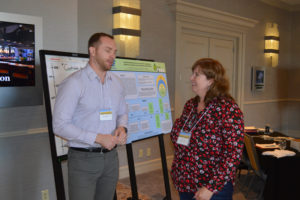
Ben Christ (L) in conversation with Christine Bliss, Regional Agronomist for Agrisoma
This Spring, both farmers and researchers in the Southeast United States are at work. Inside the farm gate, producers are taking advantage of every opportunity to be out with their crops, putting in extra time to ensure their production goals for the season will be met. At the same time, SPARC researchers are putting in long hours in the field, greenhouses, and laboratories to develop new varieties of carinata, best management practices for production, and post-harvest uses of the grain. Maintaining the connection between these two groups is imperative. Early in its formation, SPARC leadership foresaw the need of a strong and diverse Extension team that would act as a conduit of information for the project’s various working groups and other stakeholders. More importantly, SPARC Extension serves as a bridge between the busy scientists and the producers and regional Extension agents that enact change on the agricultural landscape. One of the team’s primary objectives is to understand the farmers’ expectations and what they would need to effectively grow the crop during the winter months.
Dr. Wendy-Lin Bartels and Benjamin Christ, both from the University of Florida’s School of Forest Resources and Conservation, are social scientists leading SPARC’s understanding of the barriers and opportunities that may exist for producers in the Southeast to adopt carinata. They began with broad questions directed to the many stakeholders involved with SPARC, and have since directed their focus to regional agents and producers. Through surveys at Carinata Field Days and phone interviews, Wendy-Lin and Ben have constructed a scalar model of the barriers and opportunities relevant to producers in the Southeast. This information is directed back to SPARC and serves as the producers’ collective voice as researchers continue their work to develop better, regionally appropriate varieties of carinata that meet producers’ needs.
In the long-term, Wendy-Lin and Ben are working to establish a Carinata Community of Practice (CCoP) that would serve as a platform of learning and support for carinata growers. The degree to which producers rely on one another for advice and inspiration cannot be understated, and the CCoP aims to capitalize on this tendency, identifying “champion” carinata growers in various regions. SPARC Extension hopes that, with the right initial guidance, the CCoP could become a self-sustaining entity that supports carinata production in the Southeast United States long into the future.
SPARC Member Spotlight
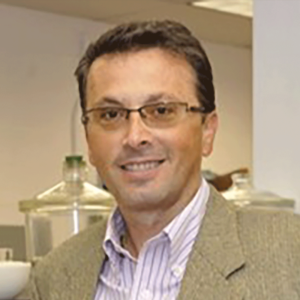 George Philippidis-SPARC Workforce Development Team Lead
George Philippidis-SPARC Workforce Development Team Lead
George Philippidis is Associate Professor and Director of the Biofuels & Bioproducts Lab at the Patel College of Global Sustainability at the University of South Florida, specializing in applied research in biofuels, bioproducts and bioenergy. Dr. Philippidis has previously held top positions at both private and public organizations, including NREL, Thermo Fisher Scientific, Crossbow Ventures, and FIU’s Applied Research Center. He has years of experience working with a variety of renewable feedstocks ranging from cellulosic biomass to algae to oilseed plants and specializes in bio/chemical process development and scale up, bioproduct recovery, techno-economic analysis, and technology commercialization. He has led and participated in several multi-million dollar bioenergy projects funded by the US DOE, DoD, USDA, State of Florida, and the private sector for development of advanced biofuels and bioproducts. He has published extensively and co-authored 11 patents in biotech and cleantech.
As lead of the SPARC workforce development team, he is responsible for developing bioenergy-focused curricula for K-12, undergraduate, and graduate students and collaborating with industry to provide students from all SPARC institutions with experiential learning in the form of bioeconomy-related research projects and internship opportunities. The education modules that Dr. Philippidis’ team is developing encompass the entire carinata value chain from crop production to seed and oil processing to distribution of jet fuel and bioproducts to the end-users and sustainability assessment. He is also a liaison to the supply chain development team of SPARC, providing valuable input to the logistics, resiliency, and techno-economic modeling activities of SPARC. He is a well-respected figure in the international bioeconomy sector and brings a balanced outlook to a public-private partnership like SPARC through his exemplary career experience.
Dr. Philippidis was born in the Macedonian region of Greece, has a Bachelor’s degree in Chemical Engineering from the Aristotle University of Thessaloniki in Greece, an MBA from the University of Denver in Colorado, and a Ph.D. in Chemical Engineering from the University of Minnesota in Minneapolis-St. Paul. He speaks several languages. When not advocating for bioenergy, he mentors young entrepreneurs, plays league tennis, sails with family and friends, reads the Economist cover-to-cover, and travels internationally.
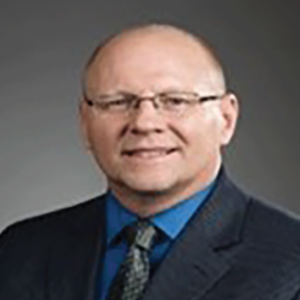 Bill Hubbard- SPARC Extension Team Lead
Bill Hubbard- SPARC Extension Team Lead
Bill Hubbard is the southern regional extension forester based at the University of Georgia. He facilitates regional education, extension and technology transfer programs among the thirteen 1862 land grant universities of the Southeast US, the USDA Forest Service, and several state forestry agencies. His areas of expertise include bioenergy and biomass supply systems, climate science education efforts, economic impact analysis, and developing tools and extension products for dissemination of information and eLearning.
As the extension lead for SPARC, Dr. Hubbard hopes to integrate his team with all other SPARC workstreams as well as all key stakeholders to understand barriers and capability gaps related to establishing a viable carinata supply chain in the Southeast US. He brings a wealth of experience and knowledge in development of extension tools, program evaluation and stakeholder engagement from his long extension career. His experience in the bioenergy world makes him especially suited to his role in SPARC. Dr. Hubbard served as the Extension lead on both the SE-IBSS bioenergy project, and the PINEMAP climate science project where his teams were recognized by the Secretary of Agriculture for successful programming. These projects were similar to SPARC in that they involved several states over a large geographical area integrating teaching, research and Extension over a multiyear time span. Dr. Hubbard continues to advocate a strategic approach to addressing issues which according to him includes scholarly engagement with proven and new technologies, applied research, social network analyses, identifying emerging issues and program delivery.
Dr. Hubbard is a midwestern by birth, but has lived in the Southern United States since his sophomore year at the University of Florida. Bill has a Bachelor’s and Master’s degrees in Forest Science & Forest Economics respectively, from the University of Florida and a PhD in Adult Education & Program Evaluation from the University of Georgia. Bill is thrilled to be a part of SPARC and has learned a great deal about carinata in just a few short months of working on the project. He is grateful to have an excellent team of Extensionists and researchers to work with and has been impressed with the ease by which these professionals have come together to solve a problem and create opportunities for farmers and rural communities.
Bill lives in Gainesville, Florida with his family of four boys, including two undergraduates at the University of Florida. He is most likely the only UGA employee living in Gainesville! They enjoy being outdoors and traveling as a family.
Graduate Student Spotlight
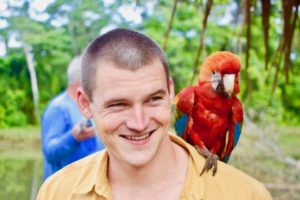 Paul Cockson- SPARC Feedstock Development team
Paul Cockson- SPARC Feedstock Development team
Paul is an undergraduate student at North Carolina State University in Dr. Brian Whipker’s lab, soon to pursue a Masters degree in the Horticulture department. He is focusing on minimizing and refining the inputs required to grow carinata more efficiently and sustainably, while maximizing yields. Paul is a strong advocate of nutrition stewardship and realizes the relevance of responsible utilization of nutrients in the context of an increasing world population and shrinking arable land.
Paul’s first encounter with plants came about through the Nebraska Master Gardner’s program where he achieved the rare title of youngest master gardener in the state. Before embarking on a more formal education he traveled extensively to countries such as Ethiopia, China, Costa Rica, Ecuador and Italy to pursue short term projects focused on sustainable production as well as fine arts appreciation. Paul has an undergraduate degree in plant and soil sciences from NCSU prior to which he got a dual associates degree in fine Arts and Sciences. Paul brings his well-rounded academic foundation to SPARC as he practices good science and expresses it impressively through his artistic abilities.
 Syed Mohammad Asiful Alam- SPARC System Metrics team
Syed Mohammad Asiful Alam- SPARC System Metrics team
Syed is a graduate student in Dr. Dwivedi’s lab at the Warnell School of Forestry and Natural Resources, University of Georgia. He is currently working on developing a site suitability model for carinata production in the Southeast US by applying his skills and training in GIS, remote sensing, environmental conservation and planning as well as sustainability science. His research goal is to produce carinata jet fuel sustainably and to achieve that, his project is identifying the most suitable locations and situations for feedstock production. Syed has a strong background and extensive experience in database preparation and management, ArcGIS and application of these in various contexts. He is currently training in forest carbon modeling, forest economics, applied linear modeling, and unmanned aerial systems in natural resources management. He has held several positions in the public and private sector before pursuing his graduate degree and thus brings to SPARC a variety of applied experience in the field of GIS and remote sensing and database management.
Events
SPARC and Agrisoma co-hosted the 5th Carinata Biomaterial Summit at Panama City Beach, FL on February 19-20, 2018. The summit was well-attended by SPARC members, our partners from the northern plains, industry partners, producers, state agency representatives and others interested in various aspects of the carinata supply chain. The summit started off with an informal meet and greet on Sunday, February 18, followed by several general and breakout sessions on the following days. Talks ranged from updates on feedstock research, barriers related to adoption in the Southeast, global updates on carinata production and adoption, strategies to create pull in the region to support a viable carinata supply chain and others. To access all the presentations and photos go to https://sparc-cap.org
This quarter was marked by several successful field days in several locations. Field days were held at Jay, FL, Quincy, FL, Milstead, AL, and Tifton, GA.
These events brought together producers, extension agents, researchers and industry partners to discuss best management practices for carinata production, how carinata fits into existing cropping systems in the region, ongoing crop improvement projects through manual and high throughput phenotyping, crop insurance and other relevant information for existing and future carinata producers. For more photos from the events go to https://sparc-cap.org
David Wright and Sheeja George represented SPARC at the Advance Bioeconomy Leadership Conference held at Washington DC on February 28-March 2. The SPARC panel was moderated by Chris Tindal, Asst. Executive Director of CAAFI and the speakers were David Wright (SPARC PD), Steve Fabijanski (CEO, Agrisoma), Chuck Red (VP, Fuels Development, Applied Research Associates), and Sheeja George (SPARC PM). The panel presented the history of oilseed crops in the Southeast, the beginning of SPARC and finally showcased the strong public-private partnership that SPARC exemplifies.
Upcoming events for Quarter 4
June 9, 2018-FAMUextension center, Quincy, FL-Contact Alex Bolques (abol@ufl.edu;) or Kome (Oghenekome.onokpise@famu.edu)
June 25-26, 2018 SPARC annual meeting at Quincy, FL (for SPARC members and invitees)


